ChatGPT’s "Memory" Is Kind of Meh. But You Can Change That.
Some ways to make the memory feature feel more organic.
Is it just me, or does ChatGPT’s memory suck?
Here’s a comment I left last week on this article by
:I feel that the current iteration of ChatGPT's "memory" feature isn't immediately useful. By default, it mainly retains dry "facts" about you (what you do, your name, your kids, etc.). You can of course force-feed it some information proactively and tell it to remember a bunch of bullet points or any other details you explicitly outline.
But I feel like what would make "memory" live up to the promise of a personal assistant is if ChatGPT could start picking up more subtle cues based on interactions. So if I e.g. ask for 10 ideas in a brainstorming session and then tell ChatGPT to go ahead with one of them, I'd like ChatGPT to draw a soft conclusion from this (what made the idea different from the other 9, and what does it say about me and my preferences) and commit that interpretation to "memory" (e.g. "Daniel prefers quick, actionable ideas instead of long-term projects.").
That way, "memory" wouldn't just be a glorified remix of "Custom Instructions" but something that feels more organic. Maybe that's coming at some stage. We'll have to see!
TLDR, I take issue with two things:
ChatGPT mostly memorizes clear-cut facts instead of subtle preferences.
ChatGPT mostly needs to be explicitly told what to remember.
That’s not how humans form memories about others.
When you meet someone new, you remember a lot more than just their name.1
Maybe you go for a handshake and the person hugs you instead.
Now you’ve learned that they’re friendly, approachable, or kind of a weirdo. (Depending on your boundaries.)
At no point during this interaction did the person stop, look you dead in the eye, and say in a monotone: “Hello. I am Matt. I am friendly, approachable, and kind of a weirdo. Please remember these facts about me!”
No.
You naturally pick this up based on your interactions.
As it stands, ChatGPT’s memory is nothing like that.
It doesn’t appear to do anything that “Custom Instructions” aren’t already doing, and we’ve had that feature since last July.
But what if I told you that I’m Daniel, I am friendly, approachable, and kind of a weirdo? there’s a way to make ChatGPT’s memory a tad more useful?
Several ways, actually.
Let me show you.
Method #1: Retroactive
This one’s best for when, after a long chat, you realize you want ChatGPT to pick up and remember key info about you.
In that case, try a prompt like this:
What can you infer about me and my preferences based on this chat that would be helpful for you to remember? Please consider any facts I’ve shared directly as well as anything you can pick up based on my choices.
Here’s what happens when I use that prompt after chatting to ChatGPT about a pretend summer party I’m supposedly planning:
If the output is too wordy and not generalizable enough, you can then ask:
Now please rewrite it as concise bullet points that are general enough to be useful for any future chats.
Here’s my chat again:
In my case, ChatGPT automatically updated its memory at that point.
If it doesn’t, simply ask it to:
There you go.
You’ve successfully extracted and saved a bunch of useful details.
But you can also flip the script…
Method #2: Proactive
If you’re starting a new chat where you expect to share important details about yourself, try this:
During this chat, keep an eye out for anything you can learn about me and my preferences based on how I answer and what I request or choose. If you learn a fact about me or develop a good understanding of what I prefer, feel free to commit it to memory. You can update the memory even if I don't explicitly tell you to do so.
You can tweak this prompt or make it more elaborate (see Method #3), but this should get you started.
This works well for the most part, but ChatGPT will occasionally save a memory that makes little sense outside the context of that specific conversation.
For instance, check out this exchange from another demo chat:
You can tackle this case by case or try to adjust the prompt to minimize the chance of non-generalizable memories.
That’s exactly what I do in the next method.
Method #3: Forever-active
Finally, you may want ChatGPT to look for opportunities to memorize more details about you at all times, not just some of the chats.
If that’s what you’re after, you can combine the powers of the “Memory” and “Custom Instructions” features.
Click on your name in the bottom-left:
Select Settings > Personalization:
Click Custom instructions and paste the following into the “What would you like ChatGPT to know about you to provide better responses?” field:
During this chat, look for opportunities to commit anything you can learn about me to your memory.
This goes for any facts I explicitly share about myself, my family, my work, or my life in general. If I share anything you think might help you better tailor your future responses to my needs, save it to memory.
This also goes for any implicit information you can gather about my preferences or interests indirectly based on my responses, choices, and so on. For instance, if I pick a specific tone of voice out of several proposed ones, use that to infer something about my general preferences.
Make anything you commit to memory generalizable. The saved memory should make sense in any context, not only in the context of a specific task or response you've given.
It should look something like this:
The above prompt is a work in progress, but it seems to do the trick in most cases. Feel free to iterate and tweak it based on your learnings.
Now, I say “in most cases” because ChatGPT will occasionally still save useless snippets like this:
But all in all, using the above methods makes ChatGPT’s memory better and nudges it closer to how I’d expect it to behave.
Don’t forget to clean up ChatGPT’s memory
If you use these methods (especially #3), chances are ChatGPT will start saving a whole bunch of little nuggets of knowledge about you over time.
Remember to check them occasionally to make sure they’re relevant and useful.
To do this, navigate to Profile > Settings > Personalization, and click “Manage” under the Memory section:
You’ll see something like this:
If there’s a memory that makes no sense or isn’t very useful, simply hit the trashcan to purge it forever:
This helps ChatGPT build up a growing library of useful insights while avoiding noise.
Over to you…
What’s been your experience (if any) with ChatGPT’s memory? Do you also see it as suboptimal or does it work better for you?
What’s your take on the above methods? Can you think of other approaches that make the most of ChatGPT’s ability to keep a running list of memories about you?
Leave a comment or shoot me an email at whytryai@substack.com.
Ah, who am I kidding?! You definitely don’t remember their name the first time around. You’re too busy saying your own and worrying if your handshake’s okay.

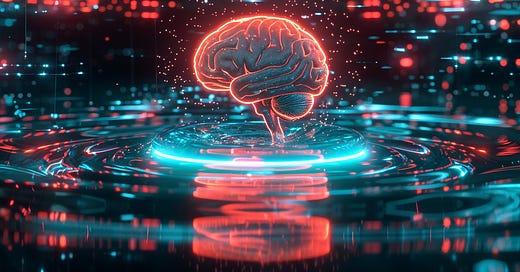



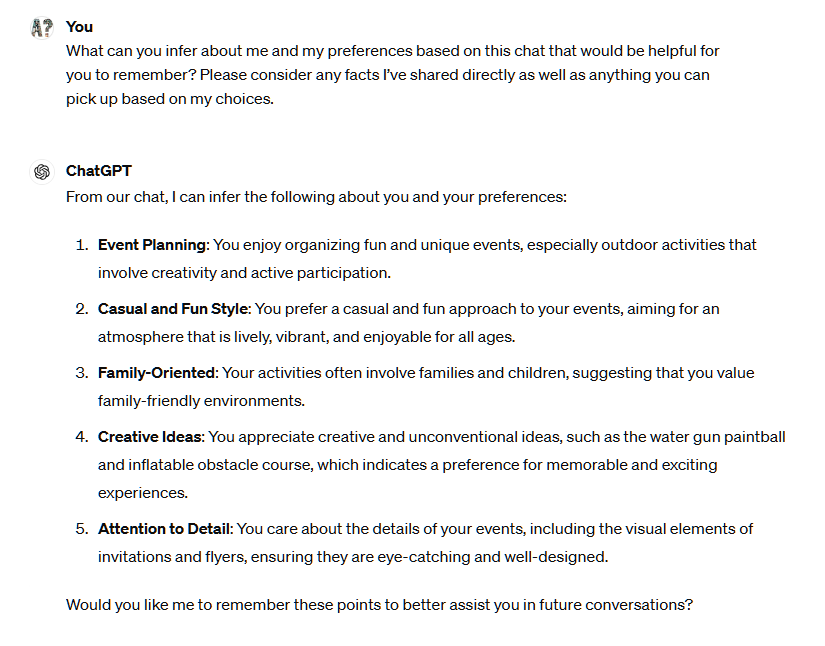
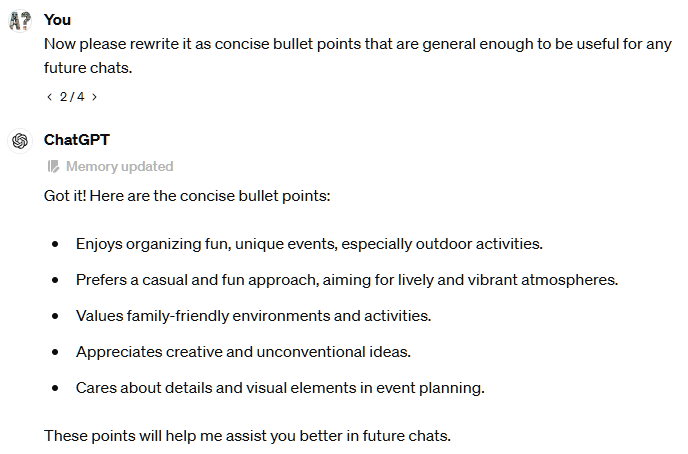
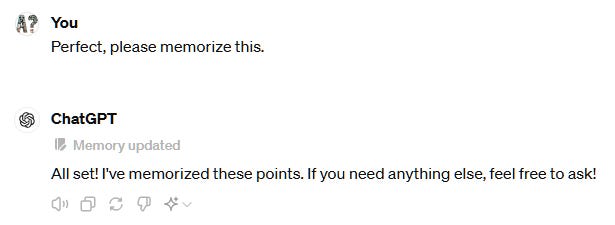
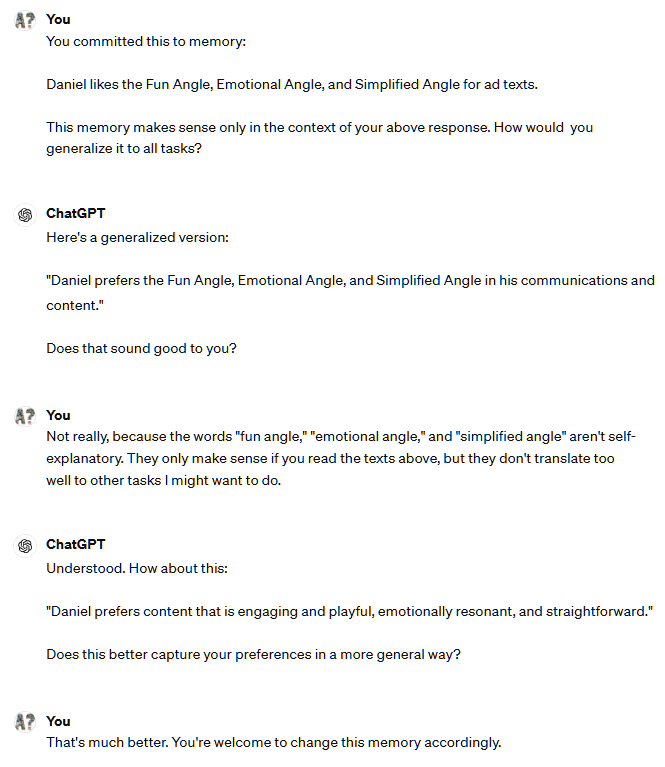
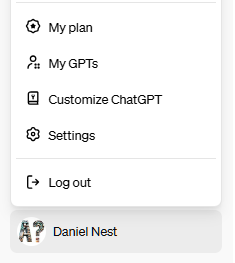
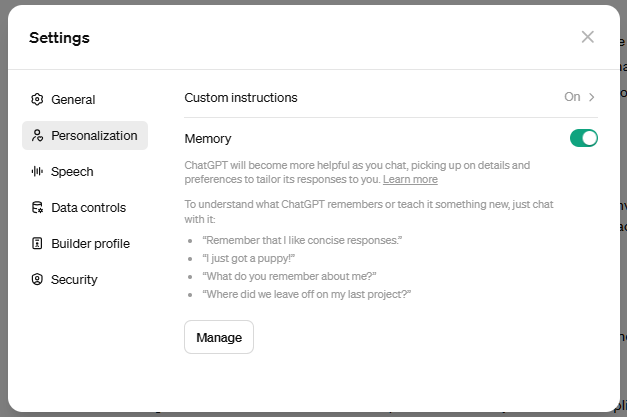
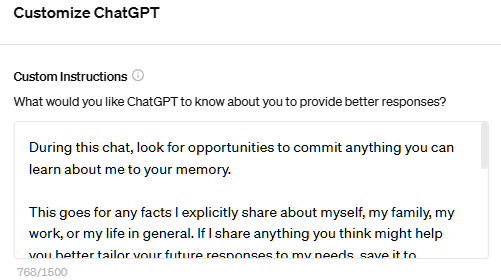

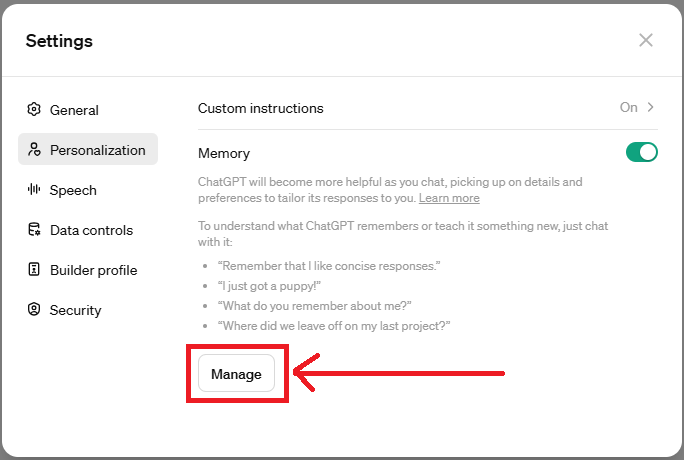


Amazing work, Daniel. I had faith that you would figure out some utility here.
If we start with the premise that this isn't human-memory, we can really get somewhere.
Can't wait to play around with these methods later today.
In short - THIS is excellent, practical and immediately useable. Thank you Daniel. I'll be linking to this from my Substack for sure. I've been curious what all is possible with the 'current' version of ChatGPT memory. Love this.